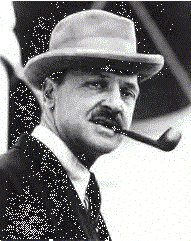Clarence Edward Dutton (1841-1912) a captain of ordinance in the U.S. army, geologist-poet and a
Yale man, Dutton was deeply influenced by the philosophies of India. It was Dutton who likened the snow-covered peaks of the canyon walls to the Hindu gods, Brahma, Vishnu and Shiva. There is even a Hindu amphitheatre which Dutton likened to the "profusion and richness which suggests an Oriental character.
It would certainly not be inaccurate to suggest that Dutton must have been drawn by the Himalayan symbolism of Vedic philosophy to have named the finest butte of the Kaibab division the Vishnu Temple and the grandest of all buttes as the Shiva Temple. For in Hindu philosophy Vishnu is attributed the aspects of preserving the world and to Shiva the aspect also of the destroyer.
On the 7,650-foot Shiva Temple he wrote:
"The Shiva Temple the grandest of all, and most majestic in aspect....All round it are side gorges sunk to a depth nearly as profound as that of the main channel...In such a stupendous scene of wreck, it seemed as if the fabled 'destroyer' might find an abode not wholly uncongenial." he observed.
Dutton describes the magnificence of what he sees of the Eastern Cloisters and
Shiva's Temple as follows:
"As we contemplate these objects we find it quite impossible to realize their magnitude. Not only are we deceived, but we are conscious that we are deceived, and yet we can not conquer the deception.....The eastern Cloister’s is nearer than the western, its distance being about a mile and a half. It seems incredible that it can be so much as one-third that distance. Its altitude is from 3500 to 4000 feet, but any attempt to estimate the altitude by means of usual impressions is felt at once to be hopeless. There is not stadium. Dimensions mean nothing to the senses, and all that we are conscious of in this respect is a troubled scene of immensity."





